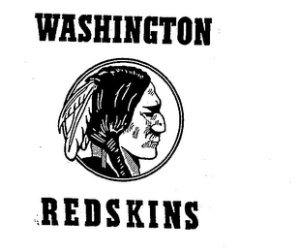(One of the trademarks registered to Pro Football, Inc. d/b/a/ The Washington Redskins)
On Wednesday, the United States Patent And Trademark Office (Trademark Trial and Appeal Board or “TTAB”) canceled the Washington Redskins’ trademark registrations in the start of what is likely to be a lengthy legal battle.
In Blackhorse v. Pro-Football, Inc., the TTAB concluded that the team’s trademarks were disparaging to Native Americans at the time they were registered, in violation of the Trademark Act of 1946. As a consequence of the violation, the TTAB ordered that the team’s trademark registrations be canceled.
At the heart of the TTAB’s ruling was its finding that the meaning of the team name “‘may have disparaged’ a substantial composite” of Native Americans at the times of the trademark registrations. [1] In making this finding, the TTAB relied heavily on a 1993 resolution issued by the National Congress of American Indians. The 1993 resolution condemned the use of the word “redskins,” labeling the term as “pejorative, contemptuous, disreputable, disparaging and racist.” [3]
The TTAB noted that it was reasonable to infer that the NCAI represented approximately one-third of Native Americans between 1967 (the year of the Redskins’ first trademark registration) and 1993. [2] But to adequately ensure that the resolution reflected the views of Native Americans at the times of each of the registrations, the TTAB pointed to a 1972 meeting between the NCAI president and Redskins’ team owner Edward Bennett Williams. [4] At the meeting, the president had represented to Williams that Native Americans found the term to be a racial slur. [5] Additionally, the TTAB noted that trends in dictionary usage from the 1960s through the 1990s reflected a general consensus that the term was disparaging. [6] Relying on this data, the TTAB concluded that the petitioners had shown that “a substantial composite of Native Americans” found the term offensive during the relevant time periods. [7]
While Blackhorse might appear to represent new ground broken in the ever-growing controversy surrounding the Redskins’ team name, it is not really a new case. In fact, a nearly identical action was brought before the TTAB in 1992, when Suzan Harjo and six other Native Americans filed a petition to cancel the registrations. In 1999, the TTAB reached the same conclusion that it did on Wednesday – that the Redskins’ trademarks were disparaging to Native Americans at the time each of the trademarks were registered.
In 2003, however, the U.S. District Court for the District of Columbia reversed the TTAB, concluding that 1) the TTAB’s decision was not supported by substantial evidence and 2) the doctrine of laches applied. [8] In 2009, the DC Circuit ultimately affirmed the District Court solely on the laches issue and never addressed the TTAB’s ruling on the merits. [9] The Redskins thus were able to preserve their trademark registrations.
In 2006, during the pendency of the Harjo case, six new Native Americans filed a petition with the TTAB to cancel the trademark registrations. After the disposition in Harjo, the TTAB incorporated the entire Harjo record into evidence for the Blackhorse case. The TTAB thus made its legal and factual conclusions on what was essentially the same evidentiary record as the Harjo case.
So in light of the DC Circuit’s final disposition in Harjo, why the different result? A new court.
In Wednesday’s ruling, the TTAB pointed out that the America Invents Act, enacted in September 2011, vests judicial review of USPTO inter partes proceedings to the U.S. District Court for the Eastern District of Virginia as an alternative to filing an appeal with the U.S. Court of Appeals for the Federal Circuit. [10] Previously, the alternative venue was the U.S. District Court for the District of Columbia, as seen in the Harjo case. As a result of the change in alternative venues, the TTAB explained that “the passage of the America Invents Act sufficiently changes the circumstances in this case so as to justify revisiting the issue.” [74] Accordingly, instead of following DC Circuit precedent, the TTAB followed its own case law and that of the Fourth Circuit in concluding that laches did not apply to the new petition. Specifically, the TTAB concluded that the petitioners had not unreasonably delayed in bringing their petition, because the Harjo litigation served as an excuse to their inaction. [11] Further, the TTAB reasoned that the Redskins had not shown economic prejudice as a result of the delay. [12]
The lone dissenting judge in the 2-1 decision saw no reason to distinguish this case from Harjo, reasoning that “[t]he consequence of petitioners’ decision to rely on the same evidence previously found insufficient to support cancellation without substantial augmentation is that the evidence before the Board in this case remains insufficient as well.” [13]
The team is expected to file a petition in the Eastern District of Virginia in the next 60 days. Team trademark attorney Bob Raskopf anticipates that the appeals process will be much quicker this time around, given the Eastern District of Virginia’s (“the rocket docket”) penchant for swiftly issuing decisions. [14]
While the case is on appeal, the Redskins will maintain their trademark registrations.
For other current race-conscious legal issues, see JGL Associate Vijay Mani’s article from May 23. For another opinion on this issue, click here.
[1] Blackhorse v. Pro-Football Inc. at 1.
[2] Id. at 65.
[3] Id. at 67.
[4] Id. at 70.
[5] Id.
[6] Id. at 70-71.
[7] Id. at 72.
[8] Pro-Football, Inc. v. Harjo, 284 F. Supp. 2d 96 (D.DC 2003).
[9] Pro Football, Inc. v. Harjo, 565 F.3d 880 (DC Cir. 2009).
[10] Blackhorse at 74.
[11] Id. at 78.
[12] Id.
[13] Id. at 83.
[14] Dan Steinberg, Redskins lawyer explains what will happen next with trademark case, Washington Post (June 19, 2014), http://www.washingtonpost.com/blogs/dc-sports-bog/wp/2014/06/19/redskins….


